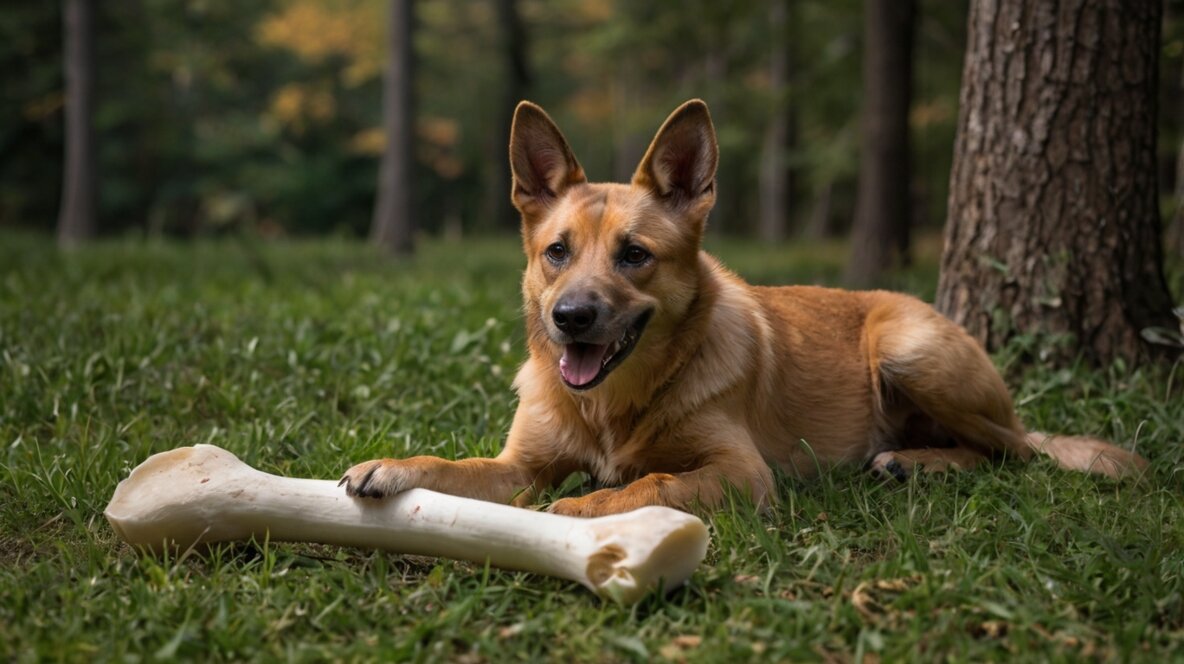Table of Contents
Introduction
As pet owners, we’re constantly on the lookout for safe, healthy ways to keep our dogs entertained and happy. One popular option is bones, but not all bones are created equal. If you’ve ever wondered whether deer bones are safe for dogs to chew, you’re in the right place. We’ll explore the benefits, potential risks, and best practices when it comes to giving your furry friend deer bones.
What Makes Deer Bones Attractive to Dogs?
Dogs have an instinct to chew, and bones offer a satisfying outlet for this behavior. Deer bones, in particular, are rich in nutrients like calcium and phosphorus, which help strengthen bones and teeth. Chewing also serves as a natural toothbrush, helping to scrape away plaque and tartar while keeping gums healthy.
In addition, chewing provides mental stimulation and can alleviate boredom in dogs. It’s not just about the physical act; it’s an enriching experience for dogs that taps into their ancestral instincts.
Are Deer Bones Safe for Dogs to Chew?
Deer bones, like any natural chew, come with both benefits and risks. On one hand, they offer nutritional value and help maintain dental health. On the other hand, they can pose dangers if not handled properly.
Benefits of Deer Bones for Dogs
- Nutrient-rich: As mentioned, deer bones provide essential minerals like calcium, which is crucial for your dog’s overall bone health.
- Dental care: Chewing helps clean a dog’s teeth by reducing plaque and tartar buildup.
- Mental stimulation: Chewing is a mentally engaging activity for dogs that prevents boredom and anxiety.
Potential Risks
- Tooth fractures: Hard bones, including deer bones, can sometimes cause broken teeth, especially in aggressive chewers.
- Choking hazards: Smaller bone fragments can break off and pose a choking risk.
- Digestive issues: Swallowed bone shards can lead to internal blockages or damage the digestive tract.
Dos of Giving Deer Bones to Dogs
To ensure your dog’s safety, follow these dos:
Choose the Right Type of Deer Bones
Not all bones are safe. Opt for large, raw deer bones instead of cooked ones. Cooked bones are brittle and prone to splintering, which can be dangerous for dogs.
Ensure Proper Size and Hardness
The bone should be large enough that your dog cannot swallow it whole or easily break it into small pieces. Avoid giving deer bones to small dogs or puppies.
Supervise Your Dog While Chewing
Always keep an eye on your dog when they’re chewing on a bone. This allows you to act quickly if a problem arises.
Monitor Your Dog for Reactions
Check for any signs of discomfort, broken teeth, or digestive issues. If you notice anything unusual, remove the bone immediately.
Don’ts of Giving Deer Bones to Dogs
Avoid Cooked Bones
Never give your dog cooked deer bones. Cooking makes bones more brittle and increases the risk of splintering, which can cause choking or internal injuries.
Don’t Give Small or Brittle Bones
Small or brittle bones are more likely to break into sharp fragments, which can damage your dog’s mouth or internal organs.
Ignoring Aggressive Chewers
If your dog is an aggressive chewer, deer bones may not be the best option. These dogs are more prone to breaking bones, which can lead to tooth fractures or ingestion of dangerous shards.
How to Prepare Deer Bones for Dogs
Cleaning the Bones
Before giving deer bones to your dog, clean them thoroughly to remove any dirt or bacteria.
Freezing or Boiling: Which Method is Best?
Freezing is often the best option because it keeps the bone hard while boiling can make the bone more brittle and less safe for chewing.
Storing Bones Safely
Store unused deer bones in the freezer to prevent spoilage and bacterial growth.
The Importance of Supervision During Chewing
Supervising your dog while they chew on deer bones is crucial for their safety.
Signs of Trouble to Watch For
- Gagging or choking
- Excessive drooling
- Difficulty swallowing
- Broken or chipped teeth
When to Intervene
If you notice any of these signs, take the bone away immediately to prevent further injury.
Common Signs of Trouble After Chewing Deer Bones
- Broken Teeth: Hard bones can cause fractures in your dog’s teeth, leading to pain and infection.
- Gum Damage: Sharp bone fragments can cut your dog’s gums.
- Choking Hazards: Small pieces of bone can get lodged in the throat.
- Digestive Issues: Bone fragments can cause internal blockages or injuries.
Alternatives to Deer Bones
If you’re concerned about the safety of deer bones, consider these alternatives:
Other Natural Bone Options
Beef bones, lamb bones, and antlers are other natural options that can be safer for dogs, depending on their size and chewing habits.
Synthetic or Rubber Chews
Rubber toys like Kong products or Nylabones are durable alternatives that pose fewer risks than natural bones.
Antlers and Other Safe Alternatives
Antlers are a popular alternative to deer bones and tend to last longer without splintering.
How Often Should Dogs Chew on Bones?
It’s essential to balance bone-chewing with other activities. While bones are great for mental and dental health, they should be given in moderation. Too much chewing can lead to tooth damage.
Deer Bone Chews for Puppies vs Adult Dogs
Deer bones can be too hard for puppies, whose teeth are still developing. Adult dogs, especially large breeds, may handle them better, but supervision is always key.
Health Benefits of Bone Chewing for Dogs
Chewing bones offers numerous health benefits for dogs, including:
- Cleaner teeth
- Stronger jaws
- Mental stimulation and reduced anxiety
Potential Long-Term Risks of Deer Bone Chewing
Over time, excessive bone chewing can lead to:
- Tooth fractures: Aggressive chewing on hard bones can cause teeth to crack.
- Digestive problems: Bone shards can irritate or obstruct your dog’s digestive system.
Choosing the Best Type of Deer Bone for Your Dog
When selecting deer bones, consider your dog’s size and chewing habits. Large dogs need bigger bones, while small dogs should have bones that aren’t too hard or large to handle.
Conclusion
Deer bones can be a beneficial and natural chew option for dogs when given with care. While they offer dental, mental, and nutritional benefits, monitoring your dog closely to avoid potential risks is essential. Opt for raw, large bones, supervise your dog during chewing sessions, and always watch for signs of trouble. If in doubt, consider safer alternatives like antlers or rubber chews.
FAQs
Is it better to give dogs raw or cooked deer bones?
Raw bones are safer than cooked bones because they’re less likely to splinter and cause injury.
What should I do if my dog swallows a bone fragment?
If your dog swallows a bone fragment, monitor them closely for signs of choking or digestive distress. Contact your vet if you notice any issues.
How often can I give my dog deer bones to chew on?
Limit bone chewing to once or twice a week to prevent tooth damage and digestive issues.
Can puppies chew on deer bones safely?
Deer bones are generally too hard for puppies. Opt for softer chew toys until their teeth are fully developed.
What are the best alternatives to deer bones?
Antlers, beef bones, and durable rubber chews are excellent alternatives to deer bones.



